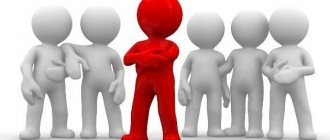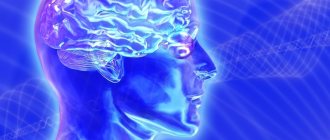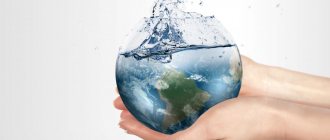In sociology, psychology and a number of other sciences, terms such as “person”, “personality”, “individual” and “individuality” are widely used. Many perceive them as synonyms, but each of these words has its own meaning and implies a specific set of characteristics. Therefore, these terms are not interchangeable and the context should be well understood when using them. Today we will analyze in detail how they differ from each other and how not to make mistakes when using these words in your own speech.
Definitions
- Man is a social being with consciousness and intelligence. This concept can have a biological or physical meaning. At the same time, it is the most generalized, so this word can designate both a very concrete person and an abstract one.
- An individual is a separate representative of the human race. This word denotes an individual unique person, abstracting from his morphological, psychological and social characteristics. It is obvious that an individual has a certain set of unique qualities, but within the framework of this concept they are insignificant.
- Individuality is a set of biological, psychological and social properties that make up the uniqueness of an individual, make him unique and distinguish him from other people. The components of individuality are temperament, character, intelligence, worldview, accumulated knowledge and life experience, morphological and other properties.
- Personality is a set of social qualities of an individual, which he one way or another realizes in his social life. This word can be used as a characteristic of an individual, or to designate a specific person in the context of studying his social characteristics.
Now let’s look at each of these concepts in more detail in order to more accurately understand how they differ, what they have in common, and in which cases which term should be used.
Social formation of the individual
If we understand the individual in the social aspect, then we can imagine the following understanding of this word: this is a person who participates in the socio-cultural life and activities of society, revealing his individual traits in the process of communicating with other people. Therefore, an individual can exist, as it were, in two forms: firstly, he is a separate person, a subject of certain relationships, and in this sense, every person is such; secondly, it is a member of a society who has a set of stable qualities: an actor, a writer, an athlete, a politician, a scientist... In the second case, one must become an individual, or a personality, in the process of social development.
The social development of an individual is a fairly broad concept, the elements of which are various influences on a person exerted from his very birth: purposeful and random, positive and negative. They also talk about socialization - the process of including an individual in the system of social relations, independently producing such relations and assimilating social experience.
Purposeful and systematic influence on an individual is also called education. First of all, this applies to a child, but they are also educated in adulthood - in the broader sense of the word. Education is designed to form the necessary moral qualities of a person, which also affects his socialization. The role of education, however, changes as the child develops: in the first years of life it is the main type of social influence, and at an older age its importance decreases - a person becomes more independent.
At the same time, the social development of an individual may have certain difficulties. For example, normal socialization may be hampered by the characteristics of his mental and physical development. Normal social relationships in such a situation (especially if the problems are mental) are difficult, and the child needs help for socialization.
In the social development of an individual, it is customary to distinguish three groups of external factors. The first is a “large” group, which includes space, the world, planet, country, state; these factors shape the socialization of very large groups of people, including the population of the entire planet. The second group is “average”, in which groups of people are distinguished according to a certain criterion: place of residence (city, village), nationality, audience of a media outlet (the public of a certain TV channel, movie fans, radio listeners, etc.). The third group is “small”, it covers factors that directly affect a particular person: family, friendly group, school, etc.
The social formation of an individual is, one might say, the highest level of development of a person as a social being and his highest need. In the process of such development, a person strives not only to consume (food, entertainment, knowledge, etc.), but also to give something, to make his feasible contribution to the further formation of society. At the same time, we must not forget about the internal potential of a person: the original characteristics of the future personality are still inherent in him at birth; Each of us has a certain temperament, character, certain inclinations, and a certain level of physical development. With the help of education, of course, you can shape any personality, but the approach must be individual, taking into account all the characteristics of a particular person. What works well for one individual may not work for another.
Sanguine people, for example, are more inclined to communicate and share their own experiences with other people than phlegmatic people. Cholerics are more hot-tempered and unbridled than representatives of other temperaments.
The social formation of an individual is an extremely important process for human society. If only because humans, as scientists confirm, have no instincts at all. We can say that man is the only creature who is not born by himself, but only becomes one in the process of upbringing and other types of social influence. “Mowgli people” who grew up in the forest have long ceased to be a curiosity; Since childhood, having no contact with a society of their own kind, such creatures are not capable of even basic actions. They don’t even have the instinct of self-preservation, so the very fact of such people surviving in the wild seems incredible. Animals, unlike humans, at birth already have a set of “recorded” behavioral models for all major life occasions, and these models are often quite complex. Thus, cats from a certain age begin to bury their waste, even if they were raised without a mother from birth.
At the same time, it is not yet completely known what formed first: human helplessness, forcing one to live in society, or a society in which life led to the loss of innate instincts. One thing is clear - in the process of his development, man finally “broke himself away from nature,” and since then social activity has become his main way of existence.
At the same time, the role of the individual has also changed. In the animal world, every creature strives to leave behind offspring, to continue “its blood.” This, in general, is the main goal of any living organism. But in human society, the self-reproduction of each of its members ceases to be the main goal, and another need comes to the fore - the maintenance and development of society. This is achieved by performing certain labor tasks. Only a limited part of people are able to leave behind healthy offspring, but turning these children into full-fledged people is already the task of the whole society. The biological male parent is not the only father for the child: often other “fathers” and “mothers” are more important - teachers, various celebrities (musicians, actors, writers), scientists, politicians. This is confirmed by constant socio-economic problems: often both biological parents are forced to work hard to feed their children, and then their upbringing is transferred to outside forces - these can be grandparents and other relatives, someone is “raised on the street”, someone something “brings up TV”...
Humanity understood this in ancient times. It is not for nothing that the concepts of “spiritual father” and “godfather” appeared in ancient religious cultures. Such “parents” were initially given greater responsibility for raising the child than biological fathers and mothers. Gradually, not a single individual could do without his “spiritual father.”
Of course, the social formation of the individual did not appear suddenly. Something similar, in a more simplified form, can be noted in the so-called social animals. These are ants, bees, termites and some other insects, as well as a number of mammal species - naked mole rats (African underground rodents), wolves, etc., including, of course, primates. Only a limited number of males and females are engaged in the constant reproduction of offspring in the communities of these animals; in ants, this is usually one single female and one to three males; in this case, there can be several million individuals in the entire anthill. What are all the other members of the community doing? They get food, protect the territory, conduct reconnaissance work - that is, in various ways they ensure the safety of the community and, in particular, the young. The ability of workers to reproduce does not play a special role in the survival of the community: in some species they can also sporadically produce offspring, in others they are asexual and cannot physically reproduce. But their existence is no less important for the young than the existence of their biological parents. If all working individuals stop doing their activities and begin to reproduce without exception, the community will die. Human society is very similar to the communities of these animals, except that people have much more “professions” (in the narrow and broad sense).
Human
As we have already found out above, a person is a general concept that denotes a social being with consciousness and intelligence. Man was formed as a result of evolutionary development, as well as a number of socio-historical processes. Using this term, we usually mean a representative of the human race with all the qualities and characteristics inherent in the biological species Homo Sapiens (reasonable man).
From a psychological point of view, the term “human” combines biological and general social characteristics, as well as the ability to engage in various activities specific to a given biological species.
From a biological point of view, a person is a creature that differs from other mammals in such features as:
- upright posture and special body structure;
- using articulate speech to communicate;
- the presence of consciousness, the ability to understand the essence and cause of various phenomena;
- the ability to meaningfully and purposefully perform complex work in order to obtain a certain result (and not obeying instincts, as happens in animals);
- the ability to create and use tools.
From a philosophical point of view, a person is an integral system that has physical and mental principles, determined genetically. This is the unity of biological, social and spiritual qualities.
To remember how the concept of “person” differs from the concept of “personality”, you should understand one simple thing: a newborn child is already a person, since all the elements of human nature are inherent in him. At the same time, he becomes a person later - in the process of socialization, when he acquires his own individuality.
Relationship between terms
Based on the definitions of “individual”, “personality” and “person”, their characteristics in society can be represented as a set of certain qualities and traits . Despite significant differences, there is a strong connection between these concepts. At birth, everyone has a set of properties that can be developed and improved, thereby becoming an outstanding personality. And vice versa, if there is an unwillingness to become part of society, the subject degrades, and therefore does not become an individual.
Taken together, all three concepts can be combined with the word “subject”. It is understood as an actively cognizing the world, a purposefully acting individual. He is able to take initiative, be independent, make and implement significant decisions and bear responsibility for this. The inextricable connection between the three concepts is due to the fact that they all relate to a specific biological being.
Individual (and individuality)
This term has a special meaning in such scientific disciplines as social science and law. An individual is a single and very specific representative of the human race. It is implied that each individual has a unique set of anthropological and psychological characteristics, but these are bracketed.
From the point of view of law, an individual is a subject of legal relations, a bearer of rights and obligations , considered as a legal abstraction. His appearance, character, life experience, health, personal qualities and other characteristics do not matter. A significant property is its legal capacity.
In social science, an individual means a person as a certain statistical unit of society, possessing a certain social status and position, engaged in some kind of activity. In essence, an individual is a “technical characteristic” of a person, a certain “identifier” that makes him unique. The child receives the status of “individual” immediately after birth (although this is a controversial issue, and many authors believe that the fetus in the womb can be considered an individual already in the second month of pregnancy, since by this time its nervous system is formed).
From the point of view of psychology, each individual has individuality - a special set of properties and characteristics that determine his uniqueness and originality. However, the concepts of “individual” and “individuality” should not be confused. An individual is a person, and individuality is his unique characteristic. It determines such characteristics as preferences, interests, behavior, etc.
Thus, a person is born an individual, but does not yet have individuality. It is formed as he grows up under the influence of the environment in which he grows and socializes. In fact, the formation of individuality and personality occurs in parallel, but these concepts should not be confused either.
Properties that characterize an individual
Each concept has certain features. An individual in psychology is characterized by certain properties. These are, firstly, gender, age, physique, nervous system and functioning of brain activity. Secondly, the properties of an individual include temperament and human inclinations.
Age qualities determine all the characteristics of a person that identify his formation in the process of ontogenesis. Sexual - those properties that reflect the distinctive features of gender.
Individual-typical parameters are represented by general somatic or constitutional qualities, neurodynamic and bilateral distinctive features. The first include endocrine-biochemical properties, a single type of metabolism, and the morphological texture of the body in general. Neurodynamic characteristics determine the distinctive aspects of the psyche, and bilateral characteristics determine the highly functional geometry of the body, a repeating type of symmetry or asymmetry of the structural-dynamic features of the body and individual motor and sensory systems.
Personality
Personality is a concept used primarily in psychology. This is a subject with self-awareness, emotional experiences and the ability to know. Personality is formed exclusively in the process of socialization, and its basic properties are manifested in interaction with other individuals. From a psychological point of view, one of the key personality properties is the ability to play a certain role that meets the expectations of others.
The main characteristics of a personality are its potentials:
- creative – the ability to purposefully create material and intangible values;
- cognitive – the ability and desire to learn;
- communicative – the ability to interact with other individuals and develop through this interaction, while maintaining one’s own identity;
- value - a system of values, ideals, aspirations and beliefs acquired by an individual in the process of socialization;
- artistic – the level of artistic needs of the individual, manifested both in the creation and consumption of works of art.
The basis for personal development is considered to be her ability to control her life, make strong-willed decisions and act rationally, guided by logic and common sense, and not by immediate desires. A person who copes well with this is called a strong personality.
Obviously, a five-year-old child cannot be a strong personality. He still does not understand why and for what he should deny himself momentary pleasures. In addition, he has not yet developed responsibility, since he has no idea how serious the consequences of a seemingly harmless act can be.
It also happens that a fully grown person is not a mature person. He submits to desires and cannot subordinate them to his will. However, he is not necessarily such a rake. This may be a decent person with a good education and job, whose personality is still in the process of formation.
Personality formation is a very long process that includes 4 key elements:
- choice of social roles and related functions.
- awareness of the rules of behavior in force in society.
- relationship building and other social skills.
- the ability to make decisions and be responsible for their consequences.
A person who is a mature personality is easy to notice. As a rule, he is quite independent and does not worry about what people think about him , so he does not try very hard to meet the expectations of others. But this does not prevent him from behaving with dignity. Thanks to this combination, others often choose such individuals as role models.
How does an individual differ from a personality?
As mentioned above, the concept of “human” only distinguishes people from the rest of the animal world. To better understand it, you need to know its characteristics. That's who he is. By calling a person simply an individual, we mean that he carries within himself certain human traits that are passed on to him from birth, that is, he is a carrier of genetic information. Personality is a more complex structure. It differs from the individual in its highly developed and ability to successfully interact with other people.
Not every individual can become a person. To become a member of society, you need to improve your psychological traits, independently acquire new skills and use them. This means that in psychology, an individual is just a living being belonging to the human race. And personality is a concept associated with interaction in society and fulfilling one’s role in it.
Differences between concepts
To summarize the above, let us list once again the main features and differences of the concepts under consideration. So, man is a general concept. Unlike the others, it can be used in a biological sense to refer to a member of the species Homo Sapiens. Moreover, in almost any context, the terms “personality” and “individual” can be replaced by the word “person”. But the statement will be more generalized.
An individual is a specific person. It is a technical or legal concept used in legal documents. It does not include any personal characteristics, but strictly indicates a specific person. From the point of view of law, an individual is a subject of legal relations (owner, heir, culprit of an accident). When we consider people as individuals, we consider them the same and neglect all their characteristics, except those that are important within the framework of the problem being solved.
A personality is a socialized person with character, temperament and worldview, actively interacting with other individuals. Personality does not arise on its own; it is formed through socialization that occurs in the process of growing up.
Individuality is a set of properties and qualities that make a person unique. It is formed in parallel with the personality. To better understand how personality differs from individuality, it is worth paying attention to what epithets these words are usually used with. About a person we can say that she is “strong”, “independent”, “independent”. Such epithets as “bright”, “memorable” or “unique” are more suitable for individuality.
Psychological characteristics of the individual
An individual is considered an exact bearer of all these common traits of people. The properties of an individual in psychology are characterized by the integrity of the psychophysical organization of the body, resistance to reality and activity.
In another way, this concept can be explained as a specific person living as an individual from birth to the end of life. This is the initial state of an inhabitant of our planet in his ontogenetic development and phylogenetic formation. It represents a concrete product of the creation of life, interaction with surrounding criteria, and not conditions taken from nowhere.
It is impossible to portray a personality without considering his individual characteristics. They are the foundation of human content. The conditions for the development of a particular representative of Homo sapiens depend on them, for example, on those inclinations that were genetically invested in him.
It is worth noting that an individual has two main functions. One of them can be qualified as conservation, because it directly characterizes the spectrum of dynamic and energetic characteristics and resource abilities. The other, the function of change, is the plasticity of behavior.
Interrelation of concepts
All of the above related mainly to the differences between the concepts under consideration. At the same time, there is a relationship between all of them, which also cannot be ignored. The concepts of “individual”, “individuality” and “personality” can be considered as stages of a person’s personal evolution. Every person becomes an individual immediately after birth. As he grows up, he acquires individuality , which consists of genetically determined and acquired properties.
Personality and individuality are formed in parallel, largely under the influence of the same factors. As an individual develops psychologically, he acquires unique traits that help him interact better with society and the environment. At the same time, all three concepts are applicable to it, which characterize it from different sides. Each person is an individual, personality and individuality. And what to call it depends on the goals and objectives set.
The individual as a representative of the human species
The human community is made up of individuals. That is, we can use this word to call any representative of Homo sapiens, regardless of age, race, level of mental development, state of health or position in society.
In relation to a representative of an animal community, the concept “individual” is usually used. Sometimes a person is called that, but in this case this term sounds with a tinge of disdain, or even as an outright insult.
So, an individual is a representative of people as biological beings, and his characteristics also have a biological nature. These include the following:
- genotype – a set of innate characteristics of genes that creates conditions for the unique development of an organism;
- phenotype - a set of characteristics of an organism that are the result of the interaction of the genotype with the environment;
- the integrity of the biological and physiological structure of the body and its resistance to environmental influences.
By the way, the difference between an individual (human) and an individual (animal) lies precisely in biological - genotypic and phenotypic characteristics. Neither speech, nor consciousness, nor work activity or upright posture are characteristics of an individual. Although they are unique to humans, they are not biologically given, but are formed in the process of human development under the influence of society.
Therefore, we can include in the category of “individual” newborn babies who cannot speak or walk, and mentally disabled, and deaf-mute, and even those in a coma. A person is born an individual and remains one until death, regardless of the conditions of existence.






